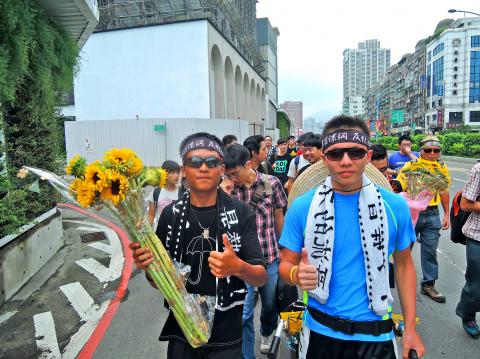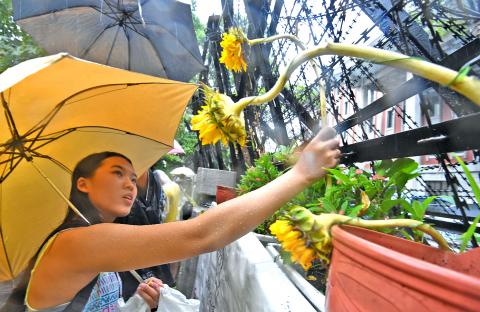Two student-rights advocates returned to the main site of protests over high-school curriculum guideline changes yesterday, completing a national walking tour to highlight the issue.
Hsu Kuan-tse (許冠澤) and Chou Tzu-hsiang (周子翔) led a parade of students and rights advocates in front of the Ministry of Education building for the final leg of the tour, shouting: “Reject black box procedures”; “Oppose brain-washing education”; and “Students are not idiots” as they marched in pouring rain to the ministry gates.
“I have already given up on ministry officials — no matter what you say, they do not listen,” Hsu said. “Eventually, when we grow up, we will take over [their] positions and do a better job.”

Photo: Weng Yu-huang, Taipei Times
Hsu said that while he had kept his word, finishing a nationwide walk, Minister of Education Wu Se-hwa (吳思華) had broken his promise to publicize the names of members of the committee that approved controversial “fine-tuning” of social studies guidelines.
At an Aug. 3 meeting with student leaders, Wu said he would publicize the names within 10 days, if the committee members gave their consent.
Hsu last week attempted to meet Wu at a summer school promotional event Wu was to attend at an elementary school in Jian Township (吉安) in Hualien, but Wu canceled his participation after hearing that student-rights advocates would be there.

Photo: Photo: Liu Hsin-de, Taipei Times
Chou said that after completing the tour he feels like he has “fully experienced life’s hardships,” adding that he plans to focus on promoting student activism in schools and prepare for college entrance exams next year.
The pair began their tour from the ministry’s gate on July 23, walking an average of 10 to 14 hours a day, covering 1,100km, they said, adding that they presented petitions to city and county governments to oppose the guidelines.
According to media reports, they were followed by police throughout their tour, during which they staged protests, including the disruption of a ceremony for National Kaohsiung Normal University president Wu Lien-shang (吳連賞), who was reportedly on the committee that approved the guidelines.

A preclearance service to facilitate entry for people traveling to select airports in Japan would be available from Thursday next week to Feb. 25 at Taiwan Taoyuan International Airport, Taoyuan International Airport Corp (TIAC) said on Tuesday. The service was first made available to Taiwanese travelers throughout the winter vacation of 2024 and during the Lunar New Year holiday. In addition to flights to the Japanese cities of Hakodate, Asahikawa, Akita, Sendai, Niigata, Okayama, Takamatsu, Kumamoto and Kagoshima, the service would be available to travelers to Kobe and Oita. The service can be accessed by passengers of 15 flight routes operated by

GIVE AND TAKE: Blood demand continues to rise each year, while fewer young donors are available due to the nation’s falling birthrate, a doctor said Blood donors can redeem points earned from donations to obtain limited edition Formosan black bear travel mugs, the Kaohsiung Blood Center said yesterday, as it announced a goal of stocking 20,000 units of blood prior to the Lunar New Year. The last month of the lunar year is National Blood Donation Month, when local centers seek to stockpile blood for use during the Lunar New Year holiday. The blood demand in southern Taiwan — including Tainan and Kaohsiung, as well as Chiayi, Pingtung, Penghu and Taitung counties — is about 2,000 units per day, the center said. The donation campaign aims to boost

ENHANCING EFFICIENCY: The apron can accommodate 16 airplanes overnight at Taoyuan airport while work on the third runway continues, the transport minister said A new temporary overnight parking apron at Taiwan Taoyuan International Airport is to start operating on Friday next week to boost operational efficiency while the third runway is being constructed, the Ministry of Transportation and Communications said yesterday. The apron — one of the crucial projects in the construction of the third runway — can accommodate 16 aircraft overnight at the nation’s largest international airport, Minister of Transportation and Communications Chen Shih-kai (陳世凱) told reporters while inspecting the new facility yesterday morning. Aside from providing the airport operator with greater flexibility in aircraft parking during the third runway construction,

American climber Alex Honnold is to attempt a free climb of Taipei 101 today at 9am, with traffic closures around the skyscraper. To accommodate the climb attempt and filming, the Taipei Department of Transportation said traffic controls would be enforced around the Taipei 101 area. If weather conditions delay the climb, the restrictions would be pushed back to tomorrow. Traffic controls would be in place today from 7am to 11am around the Taipei 101 area, the department said. Songzhi Road would be fully closed in both directions between Songlian Road and Xinyi Road Sec 5, it said, adding that bidirectional traffic controls would